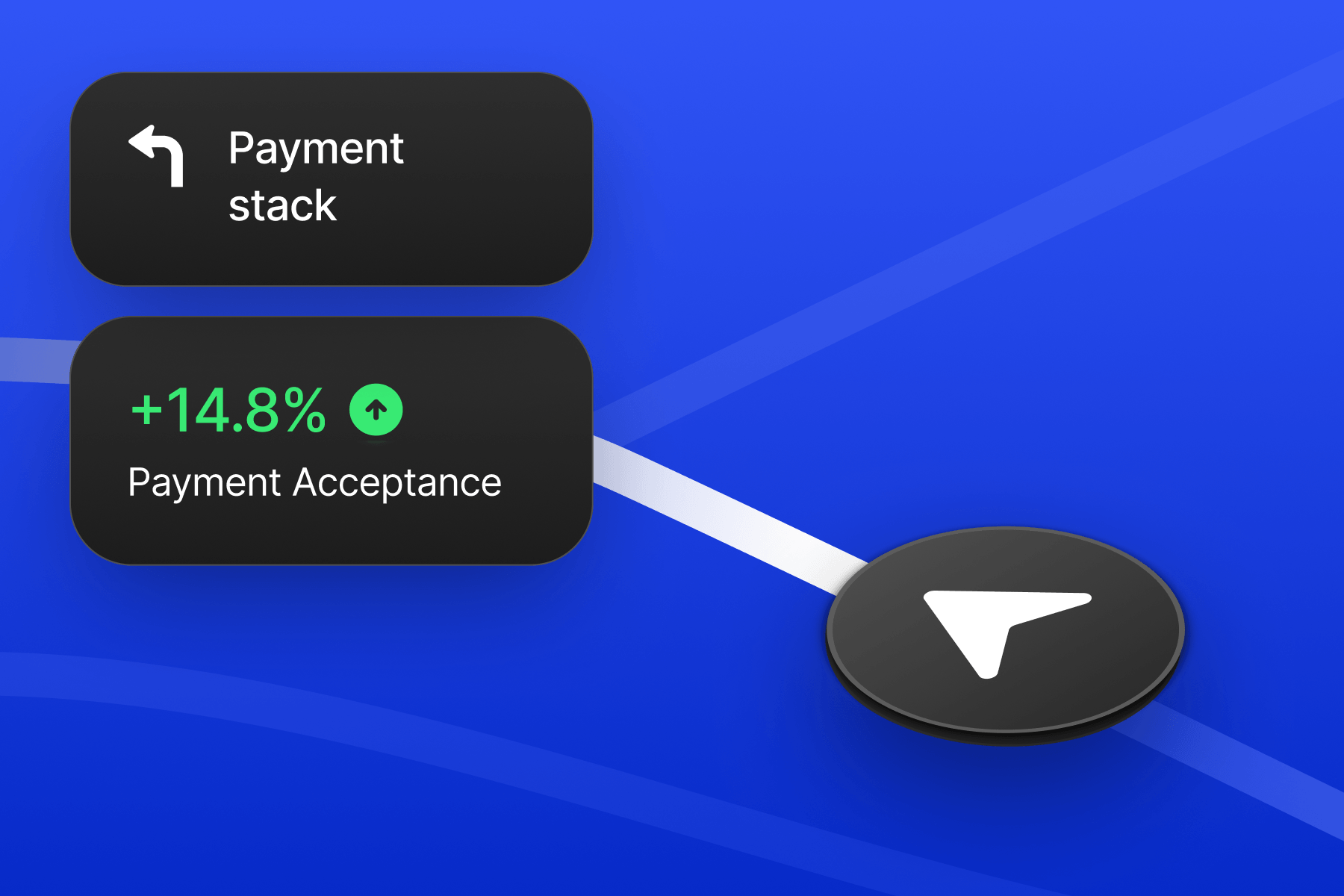Smart payment routing: Maximize conversions & approval ratestle
Payments 101
12 Feb 2025
10 min

Intelligent payment routing is a competitive edge. Here’s how it works and why businesses need it to maximize growth in global markets.
As your business expands globally, managing payments gets trickier. Different regions have their own preferred payment methods, banks apply unique risk rules, and some acquirers perform better than others, depending on the market.
According to Solidgate data, up to 30% of online payments fail due to card declines, fraud checks, and inefficient processing routes, costing online merchants valuable revenue and driving up involuntary churn rates.
Consider Brazil, for example. With low credit card penetration and a strong preference for local payment methods like Boleto Bancário and PIX, using an international acquirer instead of a domestic one can slash approval rates by over 20%. Similarly, in Europe and the U.S., factors like Strong Customer Authentication (SCA) requirements in the EU and strict issuer risk models in the U.S. create unique authorization challenges for merchants.
That's where intelligent payment routing comes in. By dynamically selecting the optimal payment flow for each transaction, businesses can maximize authorization rates and protect their bottom line. But how exactly does smart payment routing work? And what are the best practices for implementing payment gateway routing effectively? Let's break it down.
What is intelligent payment routing?
At its core, intelligent payment routing (also known as smart payment routing) is a sophisticated system that directs transactions through the most efficient payment processors, acquirers, or gateways based on real-time data analysis. Unlike traditional static payment routing, which relies on fixed pathways, routing payments intelligently adapts dynamically, considering multiple crucial factors such as:
- Card issuer preferences (some issuers consistently favor specific acquirers)
- Transaction amount and currency
- Geolocation and regional regulatory requirements
- Fraud detection and risk scoring
- Acquirer performance metrics (success rates, processing speed, transaction fees)
Below, you can see what an intelligent routing payments system might look like in practice:

Intelligent payment routing vs traditional static
| Feature | Intelligent payment routing | Traditional static routing |
| Routing method | Dynamically selects the best path based on real-time data | Sends transactions through a fixed, pre-defined path |
| Adaptability | Adjusts to issuer preferences, region-specific requirements, and fraud signals | No flexibility—same path for every transaction |
| Approval rate optimization | Routes transactions to the acquirer with the highest approval probability | Sticks to a single acquirer, even if approval rates drop |
| Failure recovery | Automatically retries failed transactions through alternative acquirers | Limited or no retry logic, leading to higher failure rates |
| Cost efficiency | Reduces processing fees by selecting the most cost-effective route | Potentially higher transaction costs due to suboptimal routing |
| Fraud and compliance handling | Adapts to local security requirements to reduce compliance issues | One-size-fits-all approach, leading to unnecessary declines |
| Performance monitoring | Continuously evaluates acquirer performance and adjusts routing in real time | No tracking—businesses must manually review and switch acquirers |
| Revenue impact | Maximizes revenue by increasing approval rates and minimizing churn | Lost revenue due to unnecessary declines and rigid acquirer selection |
plays a key role in this process by providing a unified payment infrastructure, centralizing multiple providers, and optimizing transaction flows. Smart payment routing is an essential component of , dynamically selecting the best path for each transaction based on real-time data analysis. The result: significantly fewer declines and higher conversion rates.
At Solidgate, we simplify this complex process by providing a unified payment infrastructure to help businesses efficiently route payments, improve payment performance, and maximize revenue potential. Keep reading to discover how intelligent routing payments can work for your specific business needs—or to explore how Solidgate's intelligent routing solution can streamline your payment operations.
How intelligent payment routing works
Intelligent payment routing operates through a series of sophisticated algorithms and decision-making processes that happen in milliseconds when a customer initiates a payment:
- Initial transaction analysis: When a customer submits a payment, the system instantly analyzes dozens of data points, including the card type, issuing bank, transaction amount, customer location, and merchant category.
- Rule-based routing: The payment gateway routing system applies pre-configured routing rules based on historical performance data. For example, if a particular acquirer consistently achieves 90% approval rates for U.S.-issued Visa cards but only 70% for European cards, the system will route accordingly.
- Real-time decisioning: The routing engine makes instant decisions by calculating approval probabilities across available payment processors, selecting the one most likely to approve that specific transaction.
- Continuous learning: The system constantly monitors success rates and updates its routing logic based on the most recent performance data, adapting to changes in acquirer behavior or issuer policies.
- Failover mechanisms: If the primary route fails, the system automatically attempts alternative routes based on decline reason codes, protecting the transaction from being permanently lost.
For example, when a customer from Germany tries to purchase from a U.S. merchant using a Mastercard, the intelligent routing system might determine that routing through a European acquirer with strong SCA compliance capabilities will yield a 15% higher approval rate than using a U.S.-based acquirer for that specific transaction.
How routing impacts approval rates
False declines, cross-border frictions, and inconsistent acquirer performance all chip away at approval rates. Intelligent payment routing finds the path of least resistance, so transactions get through instead of getting blocked. It operates through a series of sophisticated algorithms and decision-making processes that happen in milliseconds when a customer initiates a payment:
Reducing false declines
In online payments, many declined transactions are false positives, where an issuing bank rejects a legitimate transaction due to outdated fraud detection models or overly cautious risk settings. Up to 25% of card declines fall into this category, according to a comprehensive study by J.P. Morgan. These false declines not only result in immediate revenue loss but also long-term customer attrition.
For example, in the U.S., subscription businesses often face unusually high decline rates because traditional fraud detection systems flag recurring payments as suspicious activity. One fitness subscription app we worked with experienced a troubling 20% decline rate from a single major issuer, which was successfully resolved by implementing smart payment routing through a different acquirer with better issuer relationships.
The challenge becomes more complex with card network updates. When major networks implement new authorization rules, static routing systems often experience temporary approval drops of 5-10%.
Routing for payment processing helps reduce false declines by:
- Identifying specific issuers more likely to approve certain transaction types
- Automatically rerouting payments to acquirers with historically higher success rates for similar transactions
- Creating issuer-specific routing rules that account for known decline patterns
- Preventing unnecessary declines without increasing actual fraud risks or exposure
Optimizing transaction paths for cross-border payments
In cross-border scenarios, where the issuing bank, merchant, and bank are located in different countries, payment processing faces additional friction due to exchange rate losses, varied regulations, and conflicting fraud rules.
A merchant based in Europe processing a U.S. customer's payment may face significantly higher decline rates if the transaction is routed through a local EU acquirer instead of a U.S.-based one with better domestic connections. This is especially important when considering local acquiring licenses and payment scheme memberships.
For example:
- U.S. merchants typically see an 85-90% approval rate on average for domestic transactions
- Latin American markets can have dramatically lower rates, often as low as 50-60%, due to stricter bank policies and higher fraud concerns
- EU-based businesses might need Strong Customer Authentication (SCA) compliance, substantially impacting approval rates for non-compliant payment flows
- APAC regions often show notable approval variations between domestic and international acquirers
With smart payment routing, payments are intelligently directed to the most effective processor based on customer location, transaction currency, and historical approval rate data, leading to a 10-15% increase in overall approval rates on average.
Recovering failed payments
Even with the best routing strategies, some transactions will inevitably fail due to various legitimate reasons. However, intelligent transaction routing can immediately attempt to recover these failed payments by retrying them through alternative acquirers or adjusting retry timing based on the specific decline reason provided.
The key to successful recovery when routing payments lies in understanding decline reason codes, as each requires a tailored approach for optimal results.
Here's how effective recovery works:
- Soft declines (e.g., insufficient funds, temporary bank restrictions) can be automatically retried within 24 to 48 hours to improve authorization success when timing issues are resolved. Different decline types benefit from specific retry windows.
- General declines (issuer-based rejections) can be instantly rerouted to another acquirer with a higher probability of approval for that specific card type or issuer. Transaction data shows this approach can recover 20-25% of these declines.
- Hard declines (e.g., lost/stolen cards, fraud suspicion) should not be retried, and instead, the card should be flagged or blacklisted to avoid unnecessary processing costs. These typically require customer intervention.

We extensively cover practical strategies for handling both soft and hard declines in our article .
By carefully analyzing the specific decline reason and applying sophisticated automated retry logic, businesses can recover up to 30% of initially failed transactions, ensuring better customer retention and significantly reducing involuntary churn rates.
Why businesses need smart routing
Every failed payment isn't just a missed transaction—it's potential lost revenue, increased customer churn, and higher operational costs over time. Here's how intelligent routing of payments helps solve these critical business challenges.
Maximizing revenue and reducing churn
Subscription businesses—representing the majority of clients we at Solidgate work with—operate on predictable revenue models and rely heavily on high lifetime value (LTV). This makes every failed payment a direct hit to their bottom line and future growth projections.
A single failed payment could mean losing months or years of future revenue from an otherwise satisfied customer. Research by Stripe indicates that involuntary churn due to payment failures accounts for a staggering 20-40% of total customer churn for subscription businesses.
Smart payment routing helps mitigate this significant risk by ensuring payments are processed through the most efficient channels for each specific transaction type, keeping customers subscribed and revenue streams steady over time.
Lowering processing costs
Not all payment processors charge the same fees, and some acquirers offer substantially better rates based on transaction types, volumes, or regions. By implementing payment gateway routing intelligently, merchants can avoid unnecessary processing costs, optimizing for lower fees while still maintaining high approval rates.
Ensuring compliance and reducing fraud
Global payment expansion means dealing with increasingly complex regulations (like in the EU and various local requirements worldwide). Intelligent routing for payment processing helps by optimizing risk-reward decisions for each transaction and making smart, selective use of —automating acquirer selection based on compliance needs and reducing fraud exposure in the process.

How to implement intelligent routing
While payment gateway routing is powerful, successful implementation requires careful planning to see results. Firstly, implementing intelligent routing is technically complex. It involves integrating with multiple acquirers and complying with local regulations while optimizing payment flow.
Plus, you face certain acquirer limitations.
Not all acquirers are created equal: some may not fully support dynamic routing capabilities, while others may have higher latency or processing restrictions. You should continuously evaluate acquirer performance and adjust routing strategies accordingly based on real-world results.
Here is the optimal step-by-step approach to implement intelligent payment routing:
- Assess your payment infrastructure
- Review your current approval rates across different markets and payment methods.
- Identify specific regions, banks, or card types with the most frequent failures.
- Determine which decline reasons are most common in your transaction data.
- Choose the right
Not all processors support sophisticated routing for payment processing.
Check if potential payment providers offer:- Multi-acquirer support for global coverage.
- AI-driven routing that adapts in real time.
- Automated retry mechanisms to recover failed payments intelligently.
- Seamless API integration with your existing payment stack.
- Monitor and continuously optimize
Smart payment routing is not a set-it-and-forget-it system. Businesses should:- Track authorization rates and retry success rates across different markets;
- Regularly analyze processor performance by region, currency, and card type;
- Adjust routing rules based on emerging trends and regulatory changes.
By implementing payment orchestration with intelligent routing of payments, you can optimize transaction processing efficiency, reduce overall transaction costs, and ensure optimal routing strategies across different global markets.
Smart routing benefits
Let's look at how real businesses use smart routing to solve specific challenges and boost their bottom line.
E-commerce: Surviving Black Friday and holiday rushes
Online retailers face massive payment challenges during peak seasons when transaction volumes explode. Traditional routing often creates bottlenecks that lead to failed payments and lost sales during your biggest revenue opportunities.
Smart routing helps by automatically distributing volume across multiple gateways, preventing any single provider from getting overwhelmed. The system also learns from seasonal patterns and adjusts routing logic based on historical data about peak shopping behavior.
International e-commerce sees even bigger benefits through smart routing's ability to handle multiple currencies and payment methods while optimizing costs for each transaction type and geographic region.
Subscription businesses: Seamless billing
Subscription companies need bulletproof recurring payment processing to prevent involuntary churn. When a customer's subscription renewal fails, they might just cancel instead of updating their payment method.
Smart routing optimizes subscription payments by learning which gateways perform best for recurring transactions and different subscription models. The intelligent retry logic automatically attempts failed payments through alternative gateways, often recovering revenue that would otherwise be lost to subscription cancellations.
Financial services: Managing complex requirements
Banks and fintech companies process diverse transaction types with varying risk profiles and regulatory requirements. Smart routing helps optimize costs while maintaining compliance and security standards.
The technology routes transactions through specialized gateways based on risk assessment, regulatory requirements, and cost optimization. This flexibility supports complex product offerings while keeping operations efficient.
Travel companies: Handling big international bookings
Travel businesses face unique challenges with high-value transactions, international customers, and complex booking processes. Cross-border fees can seriously impact profitability for companies serving global travelers.
Smart routing optimizes travel payments by selecting gateways with favorable rates for high-value transactions, optimal currency conversion for international bookings, and reliable processing for time-sensitive reservations. It also handles split payments, group bookings, and multi-currency transactions that are common in travel commerce.
Smart routing is competitive edge
If you're scaling globally, intelligent payment routing isn't optional—it's essential for sustainable growth. By optimizing transaction paths, reducing false declines, and lowering processing costs, merchants can increase approval rates by 10-15% and recover up to 30% of initially failed payments.
Here's where to start improving your payment acceptance rates today:
- Leverage real-time dynamic routing to intelligently select the best acquirer for each individual transaction
- Implement strategies to maximize approval rates in key strategic markets
- Deploy sophisticated automated retry logic to recover failed payments without increasing risk exposure
- Optimize authentication flows for compliance with SCA, 3DS2, and various regional regulations
- Continuously monitor acquirer performance to refine and enhance your routing strategy over time
Ready to transform your payment processing with intelligent routing? today to discover how our advanced payment gateway routing platform can help you reduce declines, increase conversions, and maximize your revenue potential across global markets.



